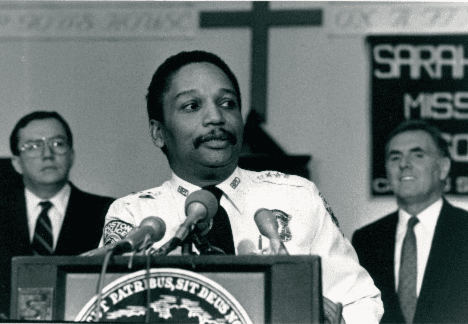
The procession of well-wishers paying their respects to the late William “Billy” Celester Sunday was a who’s who of prominent Bostonians. Elected officials, Roxbury luminaries, police brass and rank-and-file officers filed through Morningstar Baptist Church for a memorial service honoring the former Area B commander.
Newark, New Jersey Public Safety Director Brian O’Hara led a contingent of 13 officers from the city who came to pay their respects, to Celester, who in the 1990s served as commissioner there, and delivered proclamations from Mayor Ras Baraka and the Newark City Council.
Mustapha Farrakhan, son of Nation of Islam Minister Louis Farrakhan, flew in from Chicago to deliver his father’s respects.
Former Boston Police Commissioners William Gross and Paul Evans, Mayor Michelle Wu, state Sen. Nick Collins and City Councilor Ed Flynn were among those in attendance.
Jeffrey Lopes, the president of the Massachusetts Association of Minority Law Enforcement Officers (MAMLEO), a group Celester helped found in the 1970s, read a proclamation from the Massachusetts Legislature.
But it was Celester’s fellow Roxbury residents whose recollections delivered some of the most poignant moments during the two-hour service.
Attorney James Dilday recalled a friendship with Celester that went back to elementary school days, when the two played basketball and baseball at Columbus Park.
“He was my buddy,” Dilday said. “He was always a gentleman. He always gave of himself to others.”
Dilday, a defense attorney, took a different path than Celester, often defending those who Celester sought to lock up. He recalled that at the height of the crack epidemic in Boston, when dealers occupied the streets around Grove Hall, often terrifying area residents, Celester proposed a strategy of stopping, frisking and arresting known gang members — a strategy Dilday told him would backfire as defense attorneys would challenge stops made without a reasonable suspicion.
“He said, ‘They’re disrespecting the elderly. People are frightened,’” Dilday recalled. “I told him, ‘If you do this, it’s going to backfire.’”
While Celester drew fire from civil rights advocates and eventually withdrew the policy, Dilday said he was nevertheless able to claim victory.
“He said, ‘I took their drugs. I took their money. I took their guns. The people in that neighborhood are as happy as they can be. Who’s the winner?’” Dilday said. “That’s the spirit of Billy Celester. A man whose life was spent serving others.”
Nation of Islam Student Minister Rodney Muhammad recalled the close relationship Celester had with Muhammad’s Mosque No. 11 Minister Don Muhammad, noting that the two of them developed the community policing model later adopted by the city and propagated across the country.
“He built a bridge, a relationship with the police department like never before,” Muhammad said.
“We thank God for the life of Billy Celester and the work he did with other community leaders to reduce violence and crime,” said Minister Randy Muhammad, who now leads Muhammad’s Mosque No. 11.
While too young to remember Celester’s time in Area B, state Sen. Collins told the gathering Sunday that he relied on Celester’s counsel when approaching criminal justice reform legislation that passed in 2020. While Collins was helping to draft a bill creating the Massachusetts Peace Officer Standards and Training Commission, Celester made sure there was a permanent seat for a representative of MAMLEO on the commission.
“I’m forever grateful for his counsel and guidance,” Collins said.
Former MAMLEO President Larry Ellison, who now sits on the POST commission, recalled sitting with Celester at Morningstar in 2018 when the city swore in its first Black police commissioner, Willie Gross.
“He looked at me with the biggest smile on his face, because he knew how much things had changed in this city,” Ellison said.
In the recollections of those gathered at Morningstar, Celester remained committed to the advancement of Black police officers and the Black community.
“He had no problem saying what was on his mind,” Rodney Muhammad said. “He never scratched where he didn’t itch. He was a powerful Black man.”
On Saturday, the Boston Police Department issued a statement marking Celester’s passing.
“As one of the original African-American members of the BPD Command Staff, Deputy Superintendent Celester was a mentor to many officers while assisting in diversifying the department to reflect the community it serves,” the statement reads in part. “In each rank that Deputy Superintendent Celester held, he built positive relationships with community members across the city.”
Celester’s funeral procession on Monday morning made its way from the Riley-Antoine Funeral Home on Humboldt Avenue to Oak Lawn Cemetery in Roslindale, where Celester was interred.










